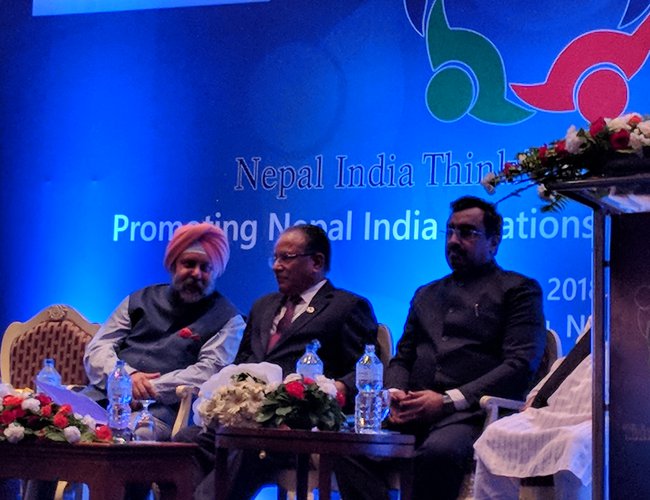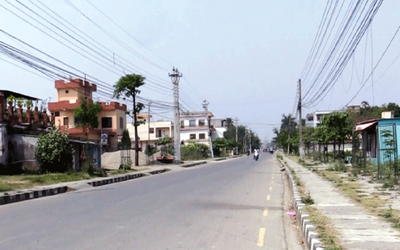
As Nepal and India have foundations in the same civilization, it is natural for them to share many commonalities in religion, culture, values and ethnicity. All ethnic groups of India have one or the other kind of religious and cultural linkage with Nepal. The same is the case with the Nepalese in their relations with India.
Indian Hindus see Janakpur, Pashupati and Mukti Chhetra as their revered places. Similarly, Nepalese Hindus see almost all of India’s shrines with reverence. Buddhists are linked by Lumbini of Nepal and Kusinagar and Bodha Gaya.
Even Kathmandu has the oldest Gurudwara Nanak Math, in Balaju, which was established more than two hundred years ago by a Saint Shikh. Obviously the lovely, lonely Guru Nanak Math is in need of a Sikh Scholar to unravel its truths and legends. Until then it will remain a half-forgotten temple on a wooded hill threatened by the brick and concrete advances of Kathmandu.
Most importantly, Nepal and India are among a few countries in the world sharing an open and natural border. Nepal-India borders are demarcated by rivers, forests and mountains. Whether there is a treaty or no-treaty, no one can change this.
After the beginning of the insurgency and proclamation of Republic, radical values and ideas of Marx, Mao and Lenin have widely penetrated into the Nepalese society, corrupting Nepal’s centuries-old value systems.
As school’s curriculum has changed and new values are imposed, by the people with radical ideology and on temples and shrines, they have already shaken Nepal’s foundations and values system.
Given this situation, the opening of the Think Tank Summit 2018 by former prime minister and leader of Nepal Communist Party Pushpa Kamal Dahal Prachanda, with a talk about the basis of Nepal India relations, is itself remarkable.
Former Prime Minister Dahal, who is mainly responsible to fan anti-religious and cultural ties with India, said that Nepal India relations are moving towards the right direction following the recent high level political visits.
“Nepal and India have a long social and culture connectivity. We need to have railways, waterways, airways and road connectivity for prosperity,” said former Prime Minister Dahal, whose party’s minister is in the process of changing the school curricula, removing the topics connecting the two countries.
Ambassador of India to Nepal Manjeev Singh Puri’s statements sometimes speak volumes about the reality of Nepal India relations.
Addressing the program, Indian ambassador Puri said that the strength of India and Nepal relations was rooted in the peoples of both the countries, who share the civilization. Ambassador Puri said that the goodwill and warm welcome accorded by Nepalese people to Indian Prime Minister Narendra Modi during his visit in Janakpur, Kathmandu and Muktichhetra showed the deep attachment of people of Nepal toward s India.
In his special guest remarks, Shree Ram Madhav, National General Secretary, Bharatiya Janata Party, suggested Nepal follow the “look south policy” so that Nepal can achieve higher growth with its connection to the sea. “India and Nepal are not only connected from land, river and nature, they are also linked by religious shrines, Janakpur –Ayodhya, Lumbini-Kushinagar and Pasupatinath and Bishownath,” said Madhav.
At a time when the rulers are non-believer of what BJP General secretary Madhav believes and preaches, these time immortal natural connectivity of people’s faith is fading in Nepal.
Reviewing relations through discussion among sections of the civil society is a good exercise. However, ignoring the destructive work going on at the ground level also needs to be highlighted. As Nepal and India stand on the same edifice of civilization, the foundation of values and culture of both the countries lies in the same rock. As the rock has been badly shaken, this think tank meeting should support efforts to revitalize values and culture.

Keshab Poudel
Poudel is the editor of New Spotlight Magazine.
- IWMI: SoLAR Global Science-Policy Forum Conference
- Apr 25, 2024
- CLA: Samriddhi For Skill Development
- Apr 23, 2024
- ECONOMY: Growth At 3.3
- Apr 16, 2024
- DPM’s SHRESTHA’S CHINA VISIT High Profile, Low Key
- Apr 14, 2024
- Maha Kumbha In Barahkshetra: A Sacred Festival In Sacred Koshi (Kaushiki) River
- Apr 09, 2024
















